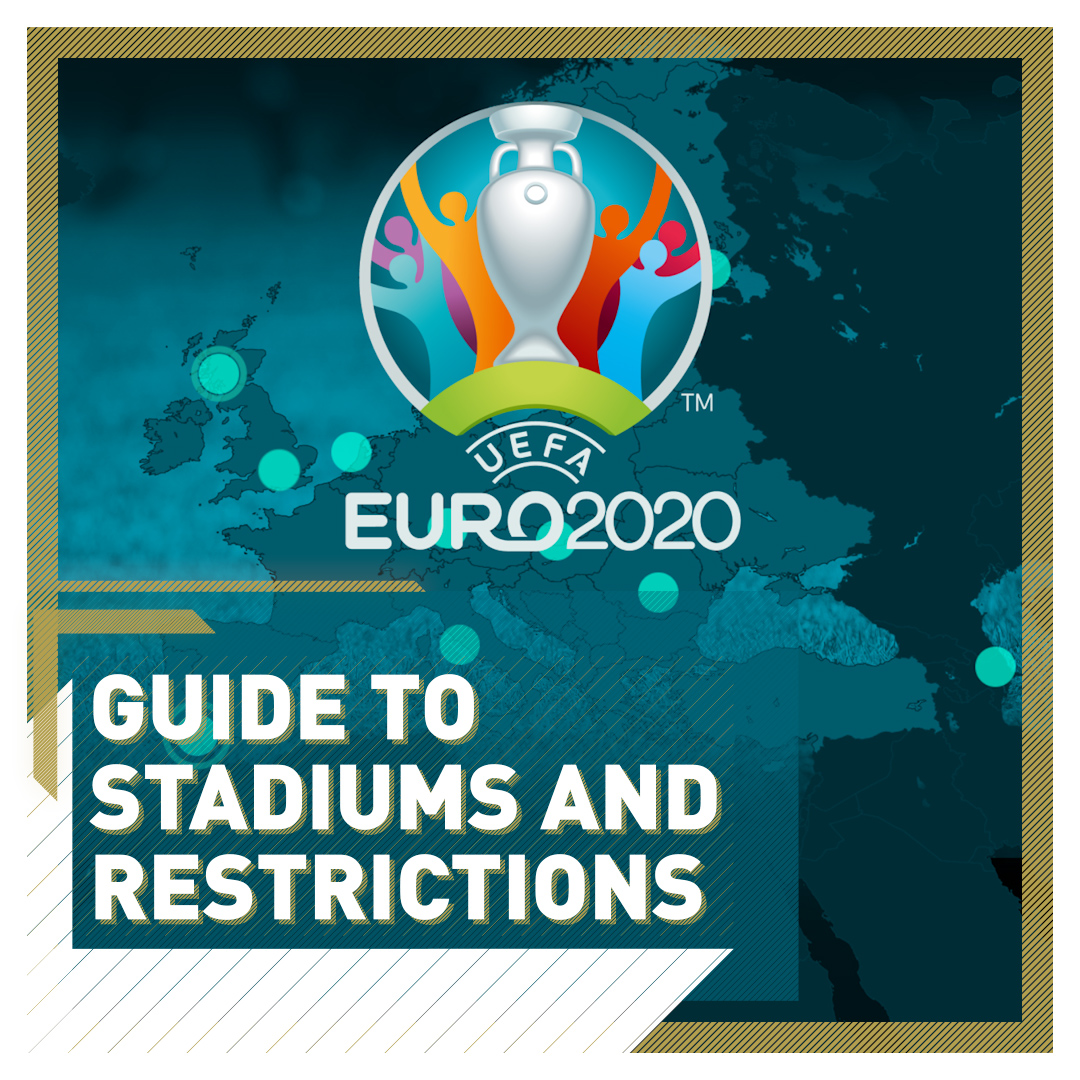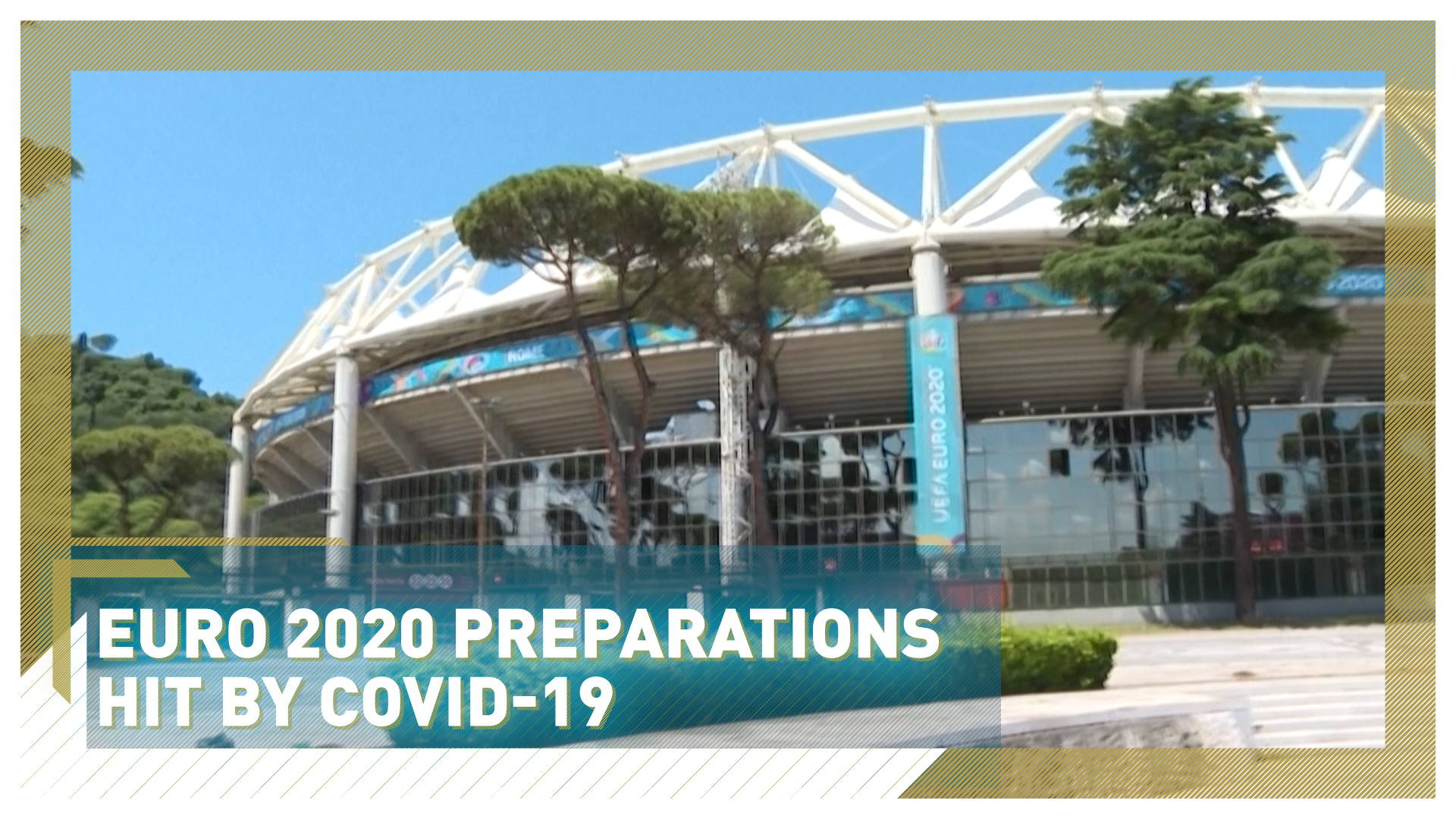
Portugal's Cristiano Ronaldo arrives at Lisbon airport wearing a mask, but he wouldn't get into the Allianz Arena in Munich with that face covering. /Patricia de Melo Moreira/AFP
Portugal's Cristiano Ronaldo arrives at Lisbon airport wearing a mask, but he wouldn't get into the Allianz Arena in Munich with that face covering. /Patricia de Melo Moreira/AFP
It is the biggest sporting event since the outbreak of COVID-19 and the health and safety protocols for Euro 2020 will be watched closely by other organizers hoping to stage their own tournaments and concerts later this year.
The competition was already a huge logistical challenge after the governing body UEFA decided to break with tradition and use multiple host countries for the tournament. Factor in the different legislation applied across the 10 nations involved, including issues such as devolved governments in the UK and Germany's regional approach to the pandemic, and you start to get an idea of what the tournament organizers are up against.
READ MORE:
Why Antarctica's snow is turning red
London's e-scooter trial begins
Emmanuel Macron slapped in the face
With thousands of fans, players, coaches and support staff traveling across Europe during June and July, there was a genuine fear that Euro 2020, already delayed a year by the pandemic, could become a super spreader event. UEFA has implemented an enhanced Return to Play protocol for the tournament in an effort to ensure supporters can attend matches and teams can compete.
02:00

Can I travel to a foreign country to watch a match?
The first thing supporters will have to consider is whether they are allowed to travel to the country hosting a match. Depending on your country of origin and where it sits in the rainbow of lists published by different governments, you may not be allowed to enter at all.
In Denmark, soccer matches are not included in the list of essential purposes for travel and no exemptions will be made for UEFA Euro 2020 ticket holders. Hungary, on the other hand, is making special dispensations for supporters and Azerbaijan is authorizing entry as long as your trip is for three days or less.
The first priority, second priority and third priority at a tournament is always fan safety
- Martin Kallen, events CEO, UEFA
What will I have to do to attend a match?
Depending on where the match is being held, there are a variety of rules and guidelines to follow, including what protective equipment to take, when to have a test and which app to download, so it is important to do your homework.
At the Baku Olympic stadium in Azerbaijan, more than 800 hand sanitizer units have been installed to help supporters follow recommended hygiene practices. In Romania, officials are urging fans to refrain from shaking hands, hugging, high-fives and any other close contact with others.
All venues are insisting supporters wear masks and in Germany, they have gone one step further – only supporters with an FFP2-grade mask will be allowed entry. So if you are hoping a scarf or a snood would work in Munich, think again.
Russian authorities have a specific fan ID that will need to be shown on arrival at the Gazprom Arena, while all other venues require a formal piece of identification such as a passport or driving license. Spain's official contact-tracing app, the Radar COVID app, will need to be downloaded by supporters in Seville accompanied by a wristband that proves a recent negative test or vaccination. However, it is not a requirement, only a recommendation.
And for those supporters heading to Wembley, there will be an online survey to fill out after the event as the UK government is using the group stage matches of the tournament as part of its Events Research Program

UEFA has issued the following code of conduct for all soccer fans attending a match this summer. /UEFA.com
UEFA has issued the following code of conduct for all soccer fans attending a match this summer. /UEFA.com
Will the stadiums be full?
· Budapest aims to use 100 percent of the Puskas Arena's capacity, but with strict entry requirements for spectators.
· Saint Petersburg and Baku have confirmed capacities of 50 percent.
· Amsterdam, Bucharest, Copenhagen, Glasgow, Rome and Seville will be using between 25 and 45 percent of the stadium capacity.
· London has confirmed a minimum capacity of 25 percent for the first three group matches and the first phase of the knockouts.
· Munich aims to host a minimum of 14,500 spectators, which is equal to 22 percent of the stadium capacity.
02:41

What happens if one of the players contracts COVID-19?
UEFA's Return to Play Protocol has been trialed and improved throughout the past 12 months in the Champions League final and international qualifiers. Following that, a "medical operational concept" has been shared with all the teams to neutralize the spread of the virus.
Teams will live in a bubble, avoiding all contact with the public for the entire time they are in the competition. They will take regular PCR tests and have their temperatures taken when they arrive at the stadiums on match day. Any player, coach or official who returns a positive result will immediately be removed from the group and quarantined, followed by universal testing of the entire squad and any known contacts.
UEFA has also expanded the squad to 26 to allow coaches more options in case some players are unavailable at certain stages of the tournament.

Spain's captain Sergio Busquets, right, was forced to leave the pre-tournament training camp after contracting the virus and the entire team had to isolate. /Javier Soriano/AFP
Spain's captain Sergio Busquets, right, was forced to leave the pre-tournament training camp after contracting the virus and the entire team had to isolate. /Javier Soriano/AFP
Could matches be postponed or even canceled?
The answer is yes. Spain's last warm-up match was a reminder of how fragile the system is. Captain Sergio Busquets had to quarantine and the rest of the players remained in self-isolation for 48 hours, meaning the Under-21 squad played the match against Lithuania.
If a similar situation occurs during the tournament affecting more than one player, the match will go ahead as long as at least 13 players are available for selection. That means a country may have to play a game with only two available substitutes instead of the usual five.
Teams can call up players from outside the squad to meet the minimum requirements but they will have to release the same number and will not be allowed to bring them back later in the competition.
If a country cannot name a team, there is a provision in place to delay the match by up to 48 hours but that may mean a change of venue. If rescheduling the fixture is not possible, the team that was unable to name a squad will have to forfeit the game and be considered to have lost the match 3-0.
If one of the match officials for the game tests positive, UEFA has confirmed it reserves the right to appoint a replacement, even if it is someone from one of the nations involved in the fixture.
Video animation: James Sandifer. Video editing: Gabriel Alaiz

